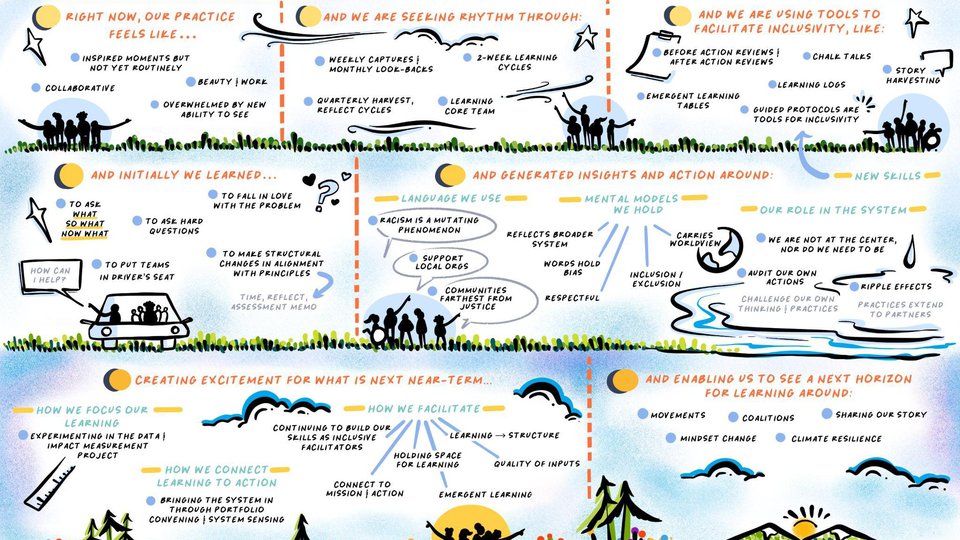Practice Makes Learning (Part II)
Written in collaboration with Erin Simmons, Global Head, Operations and Strategic Projects. Read Part I in this series, which explores how we have approached learning on an organizational level.
From committing to shared principles to cultivating a practice with learning facilitators, the first steps to learning on an organizational level outlined in
Part I
laid the groundwork for deeper learning throughout the organization and within teams, encouraging learning, reflection, and action among everyone that makes IF’s work happen.
In part II, we will share more tools and specific examples for how our learning practice has taken shape throughout the last year.
As an organization, we have:
- Experienced how protocol tools like Before and After Action Reviews, Emergent Learning Tables, Collective Story Harvesting, and Chalk Talks can facilitate inclusivity for participants
- Learned to pay closer attention to the language we use and the mental models we hold, interrogating them when needed, to better own our role in the system and fight against exclusionary and oppressive words and mindsets
- Committed to dedicating more intentional time and space to reflect deeply and apply these insights to our actions
- Initiated new internal work to evolve our practices around impact measurement to include diverse voices and types of information.
- Started convening with partners to generate and share knowledge and to continuously sense and see the system
- Developed a clearer picture of themes on the horizon for our work, such as movement building and understanding the intersection of climate and learning, in particular for our partner populations who are farthest from justice
These efforts have surfaced new ideas and refined our work together in key ways, as outlined in this graphic representation of the outcomes of our learning work.

Outcomes of the team's learning practice.
Within each of our local teams, this learning practice has unfolded in different ways to meet the varying needs of the teams and the specific geographic and cultural contexts in which they work. Here’s how our learning facilitators – Abdelrahman, Mia and Nathalie – see the learning practice as unlocking change for Imaginable Futures and learners in Sub-Saharan Africa, the US, and Brazil:
Creating Learning Spaces within our Africa Team
As learning facilitators, one of our key roles is to hold space for reflection and learning for our team to share insights, stories, questions and experiences with one another. On our Africa team, we do this during weekly “learning calls” where we harvest learnings, build on lessons and develop actionable real-time insights to experiment with and pilot in our work. To get there, we’ve been exploring many facilitation techniques, including 5-whys, which allowed us to interrogate our mental models and assumptions, and empathy maps, which helped us more effectively put ourselves in the shoes of our grantees. These learning calls have allowed us to tap into our collective knowledge, get into a ‘rhythm’ of learning and build on different solutions that we can share with our partners. - Abdelrahman Hassan
Experimenting with Knowledge Management within Our US Team
The learning facilitators worked together to create a “learning log” that each of us has adapted for our own team use. In the US team’s learning log, we track what we have been grappling with, first by identifying the topic, then exploring what is emerging, why it is important, and which actionable items we can employ as a result of the initial “what.” This tool has allowed us to identify a number of insights and corresponding action items that have guided our day-to-day work, from how we view our role in movement building to the language we use to describe what we do. - Mia Bernardino
Learning about the System from within: Insights from Our Brazil Team
Many of the questions that are most alive for us at the moment are the very questions our partners in the field grapple with, such as: how is the system changing, what influence do we have on its evolution, and how do we measure the impact of our work? Our team in Brazil is experimenting with learning shoulder-to-shoulder with our partners through a “System Sensing Roundtable,” composed of organizations that work at different levels of the Brazilian education system (from community to policy). Our first convenings have been focused on producing shared language around systems change anchored on each organization's approach, while beginning to deepen our understanding of existing system dynamics in Brazilian education. Through participatory evaluation methodologies, we also intend to develop and implement a more robust, systematic collection of systems change stories that can lead to a deeper understanding of what types of strategies enable change, in what contexts, and with what support. - Nathalie Zogbi
As we noted in part I, we share these learnings in the spirit of dialogue and accountability, both within our own work with each other and with partners, peers, and communities. What has worked for your organization or team? What could work better? Our learning logs are open!
We share these learnings in the spirit of dialogue and accountability. What has worked for your organization or team? What could work better? Our learning logs are open!